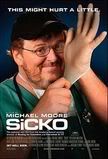
The Skinny:
Michael Moore takes on the United States health care system.
The Review:
I've always found watching documentaries from a critical stand point to be something of a conundrum. On one hand, you are watching a movie so you are analyzing the entertainment value of the film. On the other, you are watching a documentary so the subject matter itself becomes part of the overall critique. Sure, in movies the subject matter is always important, but you typically don't have your beliefs challenged or called into question as much as in a documentary. I mean, I can watch American Psycho and know it's a great movie without being in agreement of a psychopathic murderer's point of view. That being said, you can't watch a movie like this and ignore the content. It sort of defeats the purpose of watching it in the first place.
My personal belief is that any information we get from the media in this country is carefully orchestrated and spoon-fed to us with a purpose in mind. We are quick to judge the actions of everyone else, but rarely hold ourselves accountable for any wrong doing. That's kind of always been the American way. Listen, I think we live in the greatest country in the world, but we have our flaws. And they are glaring. If we don't like the way you are doing things, we'll kick down the door and beat you in to submission until you see things our way. The same mentality behind going to a smaller college so you are viewed as a person and "not just a number" or working for a smaller company versus a large corporation for the same reason, we are just a little too big for our britches most of the time and lose sight of how our actions affect the people who run this country, or at least should be: us, the general public. This film is basically the antithesis of what we have been told over and over about health care in this country by our government and media. That's not to say that it's without its problems either.
Focusing on the United States health care system, primarily the behavior of large insurance companies and their practices, SiCKO is Michael Moore's unapologetic look at the other side of the argument. Say what you want about him, but he is relentless at displaying his point – almost to a fault. As with his previous works, his blueprint remains intact: purge countless statistics, presumably skewed for the benefit of the viewpoint he is trying to convey, while illustrating those points with worst-case scenario examples. That's not to say the statistics aren't alarming (they are), or the examples aren't powerful (they are as well), so long as you are aware going in that in the grand scheme of the entire argument, the picture and its ideals are tangibly distorted. In the past in his quest to "reveal the truth" Moore has been accused of, among other things, staging interviews and editing out of context material together for the benefit of achieving a desired response. My biggest beef with Moore has always been that he attacks his opposing arguments by claiming they are manipulating our perceptions with half-truths, while himself overtly propagandizing the alternative argument. In SiCKO, this is evident while contrasting the U.S. system for health care with those of other countries with universal health care coverage. He scrutinizes the horrors of the U.S. system, but doesn't turn the same microscopic eye, only summarizing the highlights of the socialized health care systems in Canada, Great Britain, France, and Cuba.
I lived in Canada a few years back for a short time, and I spoke to many Canadians that complained about the health care system. Sure it doesn't cost them during their visit, but they are, as the movie states at one point, buried in taxes and the visits are not typically in-and-out procedures. So I guess the basic rule of economics still applies: There's no such thing as a free lunch. During a visit stateside, I had a Canadian friend who had to go to the hospital here for an illness. While the cost of the visit itself was a non-issue (because of insurance coverage from their work and the illness not being major), one of the first things she said after we left was how "nice" our hospitals are and how quickly we were in and out (it was roughly a 90 minute visit). When I asked which system she'd prefer if given the choice, she said ours; so long as insurance would cover the need. I guess if the coverage applied, ours would be better than paying for health care through taxes versus outright during the visit. But it doesn't always, or rarely, and that is the very point the movie tries to illustrate. I guess it boils down to not being able to have it both ways. All that being said, I saw in this movie much the same as I have seen in all of his previous works – a very entertaining and enlightening look at the other side of the coin.
The Rub:
The 'David and Goliath' aspect of Moore's pictures have somewhat depreciated with his success over the years, but they are still powerful nonetheless; this one is no exception. Regardless of which end of the political spectrum you occupy, you can't ignore this film. Funny, powerful, and thought provoking, you can't help but be disgusted at the thought of the greatest country in the world having a health care system so flawed, and to such an overwhelming degree, that it affects almost everyone in the country. And there's the rub.
**** of *****
No comments:
Post a Comment